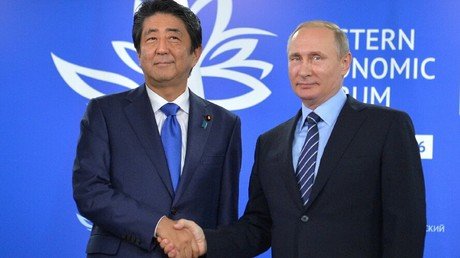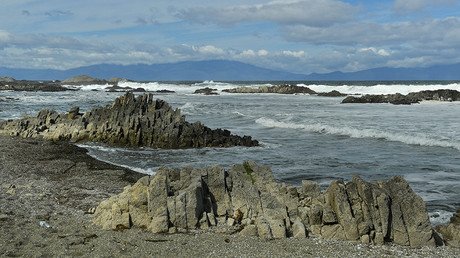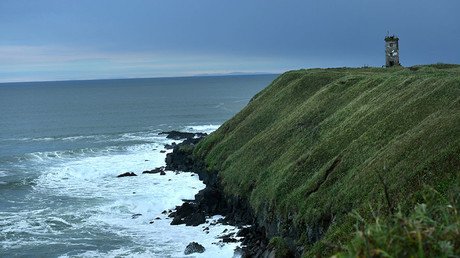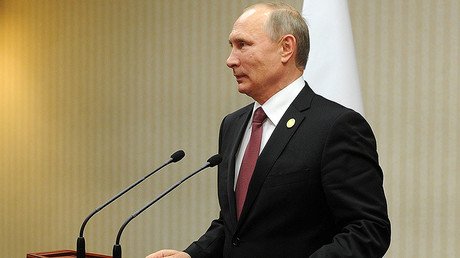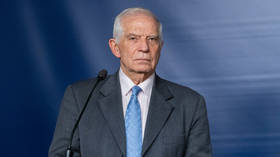Interview by Vladimir Putin to Nippon TV and Yomiuri newspaper
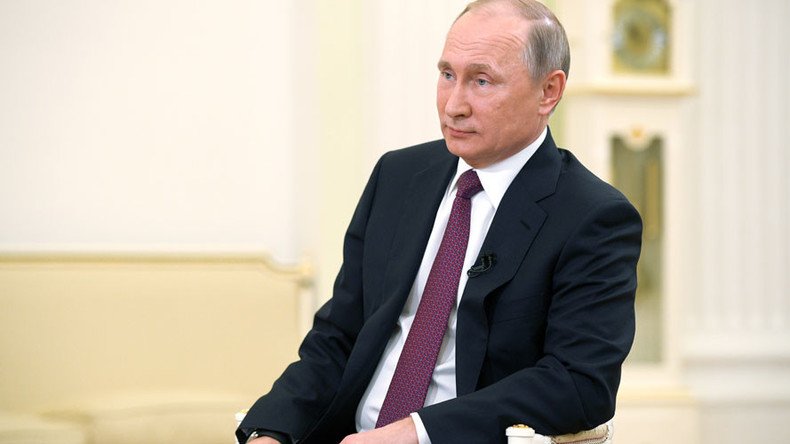
Ahead of his official visit to Japan, Vladimir Putin gave an interview to Nippon Television Network Corporation (Nippon TV) and Yomiuri Shimbun newspaper.
President of Russia Vladimir Putin: I was told that you wanted to see my dog, Yume. You can see that she is in great shape.
Question: Thank you very much. The dog is very cheerful indeed.
We would like to thank you again for finding time to grant an interview to Nippon TV and Yomiuri Shimbun. This dog is an Akita from Akita Prefecture, and we are glad to see Yume happy and cheerful. However, we were a bit surprised and afraid that the beginning of the meeting would be like this.
Vladimir Putin: You were right to take caution, Yume is a no-nonsense dog. There are many people here, with camcorders running, lights shining and cameras clicking. She is being a guard dog.
Question: Well, I believe the dog always defends you like this.
Vladimir Putin: Yes, she does.
Question: So, very soon you will visit Japan as President. I believe you are very busy.
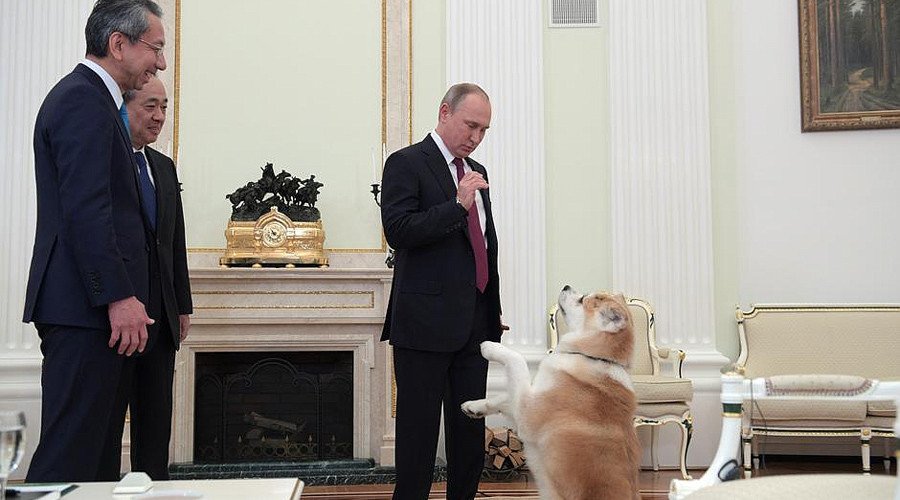
Vladimir Putin: The last time I was in Japan as President of Russia was 11 years ago, if memory serves. I later visited in my capacity as Prime Minister. However, I am in regular contact with Prime Minister Abe. We have met several times this year.
Question: This time you will meet and talk with Prime Minister Abe in Yamaguchi Prefecture, the place he calls home. What do you expect from this meeting?
Vladimir Putin: I have a huge interest in Japan, which is well known, including its history and culture, and so it will be very interesting for me to see and learn more about Japan. I have been to Tokyo and several other cities, but I have never been to Yamaguchi Prefecture. I wonder what it is like, what interesting things it has to offer. I am sure that Prime Minister Abe will tell me all about it.
Question: There are also hot springs there. Do you like hot springs?
Vladimir Putin: This never occurred to me, but yes, it could be interesting.
Question: You are well known in Japan as a judoka. In the Kodokan Institute Hall in 2000 you demonstrated your throwing technique. Your image as an athlete has made a strong impression in Japan. Let me say a few words about judo. We asked famous and respected master Mr Yamashita to share his impressions of his meeting with you. We recorded this interview. Please watch it ‒ it is about a minute long.
(viewing a video)
(Yamashita): I met with the President not as an athlete before a fight. We discussed the issue of the four islands, and I was always stunned by his abilities. He is not at all like other presidents. A man holding such a high position is willing to talk to us. I recall different instances. Sometimes his words sounded chilly. But so what? After all, he is always defending Russia’s interests. So regardless of the fact that he likes judo, there is no reason to expect him to act in Japan’s interests.
Did you like it?
Vladimir Putin: It is a pleasure to hear that. Mr Yamashita is a respected judo master not only in Japan but across the world. To me, he is an example of an outstanding athlete and a very good man.
Judo has been part of Japanese culture for a long time. It makes sense to me that this sport, which is both athletic and philosophical, was created in Japan. It is based on respect for the partner and for our elders as our teachers, which is very important and makes a strong, positive contribution to human relationships, and not only in sports. I am happy that life brought me to this wonderful sport as a child. It is like my first love. I like other sports, too, including skiing and swimming, and I am learning to play ice hockey now. But judo is definitely part of my life, a very big part, and I am glad that judo was the first sport I took up and that I have practiced it regularly and seriously. I am also grateful to Japan for this.
Question: When you were in Japan in 2000, you visited Kodokan. Are you planning to visit it this time as well?
Vladimir Putin: Honestly, I do not even know whether this is on the visit itinerary, but if there is time, I would be pleased to go to Kodokan. For anyone interested in judo, who loves judo, Kodokan is a special place. Kodokan is, to a large degree, a trendsetter in the sport. This school trained outstanding masters and is a kind of Mecca for all judokas. Certainly, I would be pleased to visit, if time permits.
Question: We strongly hope that you will have that opportunity. Allow me to touch on the subject of Japanese-Russian relations.
On December 15, you will visit Yamaguchi prefecture, which is where Mr Abe is from. It will be your fourth top-level meeting this year. We all hope that this format has a profound significance.
What do you think of it?
Vladimir Putin: I believe that meetings at the top level in a relatively informal atmosphere are always useful, and there is reason to hope that we will make progress in resolving the matters we will be considering. I remember my very first encounter with Japan. At that time, I was Deputy Mayor of St Petersburg. Out of nowhere, Japan’s Consul General in St Petersburg came to my office and said Japan’s Ministry of Foreign Affairs wanted to invite me to Japan. I was very surprised because I had nothing to do with Japan except being a judoka. This was an opportunity to visit Tokyo and a couple of other cities. And, you know, a capital is a capital everywhere: there is the official script and certain protocol. It is always easier to talk in the provinces, the conversation is more natural. Therefore, I hope that being in places from the Prime Minister’s past will motivate us to have a sincere, very practical and, I hope, productive conversation.
Question: This year it will be 60 years since Prime Minister Hatoyama and Prime Minister Bulganin signed the Joint Japanese-Soviet Declaration of 1956. The Japanese people are pinning high hopes on this historic landmark as well.
Do you think something special may be expected?
Vladimir Putin: You mentioned the 60th anniversary of the signing of the declaration. It is 60 years since the restoration of diplomatic relations, but relations between Japan and Russia have much deeper roots. In all, our diplomatic ties date back 150 years, more than 150 years now. Therefore, I do not think we should go only 60 years back but should look deeper, centuries back. Maybe this will give us an opportunity to look at the future from a more remote perspective.
As for these 60 years, and in general more than a hundred years, we have had different periods in relations and there have been tragic pages in our history, but since 1956 when we restored diplomatic relations, regrettably, we have not had a foundation on which to build ties that would correspond to our wishes and that are currently required in bilateral cooperation. We are natural partners in the world and the Far East, but the absence of a peace treaty does not allow us to develop the full range of our relations. Therefore, we will naturally strive to sign this treaty. We want full-scale normalisation of relations.
The absence of a peace treaty is an anachronism we inherited from the past and it must be removed. However, how to do this is a complicated issue. You recalled the 1956 declaration, and this declaration established the rules that should be followed by both sides and that should be put into the foundation of a peace treaty. If you carefully read the text of this document, you will see that the declaration will take effect after we sign a peace treaty and the two islands are transferred to Japan. It does not say on what terms they should be transferred and what side will exercise sovereignty over them. Yet this document was signed and not only signed but also ratified by both the USSR Supreme Soviet, or the Soviet Parliament, and Japan’s Parliament.
However, after this was done, Japan announced that it would not comply with this declaration. Later on, the Soviet Union also declared that the declaration could not be fulfilled unilaterally, by the USSR alone.
In 2000 the then Prime Minister of Japan asked me to return to this process, this conversation, these talks, and to do so, incidentally, on the basis of the 1956 declaration. I agreed. Since then we have conducted dialogue in this regard but I cannot say that our Japanese partners and friends have remained within the limits of the 1956 declaration. I think it is too early to pre-empt our talks with the Prime Minister but, of course, we hope to make progress.
Question: You said that the 1956 joint declaration is a fundamental document. Mr President, you have repeatedly discussed this subject with many Japanese prime ministers since 2000. The current Prime Minister, Mr Abe, acts on the assumption that a peace treaty may be signed subject to a settlement on the status of the four islands. We understand that you and Mr Abe have been discussing this subject for over a year now. Last autumn in New York (true, for only 10 minutes), this year in Sochi, in Vladivostok and in Lima you discussed it one-on-one. We have calculated that conversations in this format have lasted a total of two hours and 15 minutes. Apparently, it was an in-depth discussion. What prospects, in your view, are there for a decision to sign a peace treaty to be made at the upcoming meeting?
Vladimir Putin: Of course, we will work towards that end. Of course, we will work to achieve this result. However, you have just mentioned the 1956 agreement, and one may recall that these negotiations were later terminated, in effect, on Japan’s initiative. At the request of my Japanese colleagues, in 2000 we revisited the possibility of signing a peace treaty based on the 1956 agreement. However, the 1956 agreement refers to two islands while you have just said that the Prime Minister is talking about four islands. Therefore, we have already gone outside the bounds of the 1956 agreement. This is quite a different situation and quite a different approach.
I believe it is no secret that I like Japan very much – Japanese culture, sport, including judo, but it will not offend anyone if I say that I like Russia even more. Therefore, the Prime Minister and I will negotiate proceeding from our national interests: the interests of Russia and the interests of Japan. We should find a compromise. We should understand that the results of that terrible tragedy of the 20th century, namely World War II, are enshrined in corresponding international documents, and finding a way to settle all disputes without destroying the entire foundation of international law that evolved as a result of World War II is a highly delicate task. Therefore, I would like to reiterate that we cannot second-guess the course, let alone the outcome of our negotiations.
Everything that we are talking about has come to us as a result of the events of 70 years ago. In some way or other, during these 70 years we have been involved in some kind of dialogue on the issue, and that includes the conclusion of a peace treaty. However, I wish that in the course of my visit to places the Prime Minister calls home, all of a sudden, we would reach a clear understanding on how we can resolve the matters. We will be very glad if that happens. Are there any chances? Perhaps. There is always a chance, or else it makes no sense to talk. How great is it? Right now, it is difficult for me to say, because this will depend, among other things, on the flexibility of our partners.
Question: I am not a politician, not a diplomat and not a negotiator. However, as a Japanese citizen and a member of the media, I would like to note that a very favourable situation has developed: the 60th anniversary of the 1956 declaration. Mr President, you enjoy remarkably high political support in your country. It is over 80 percent. And the Abe Government also has the strongest position in Japan of all the previous Japanese governments. Polls show it has the support of 50 percent, or 52 percent.
Taking into account these factors, and the timing, and adding a third condition, specifically that previously, a majority held the view that the four islands should be returned while now, according to a poll, a far greater number of Japanese citizens believe two islands should be returned first, as a member of the media, I believe that all of the three necessary conditions are now in place.
And if so many conditions have come together, naturally, we would like to hope that this complicated situation, which, as I understood from your remarks, still exists, would be overcome.
Vladimir Putin: You have made a very good point: both the Prime Minister and I enjoy a fairly high level of trust among the citizens of our countries. However, personally, I see this as not having the right to abuse this trust, and any decision we reach should correspond to the national interests of the Russian Federation. Yet our interests, the interests of the Russian Federation, include the normalisation of relations with Japan, which is not at the bottom of the agenda. The whole range of what will be proposed for a solution, the entire range of matters related to the normalisation of our relations and what that would bring after normalisation, this is the whole range of issues to be discussed and decided, and those decisions should be of a practical nature.
Say, the Prime Minister and I have spoken a lot, and we said all the right things, in my opinion, about creating an atmosphere of trust and friendship between our nations and peoples. Our agreements on creating the conditions for preparing a peace treaty should be rooted in this trust. This may be achieved, for example, by large-scale economic activities that will also cover the Kuril Islands. It may be achieved by solving purely humanitarian issues, for instance, unhindered visa-free travel by former residents of the Southern Kuril Islands to where they used to live: visiting cemeteries, native places and so on.
This is the large range of issues we have to discuss and make a decision on each one of them. Look, after the resumption of the negotiating process in 2000, we did not refuse to consistently work toward signing this peace treaty. However, at some point a few years ago Japan unilaterally stopped those talks and broke off contacts with us. It was not we who broke off contacts with Japan, it was the Japanese side that broke off contacts with us. This is my first point.
Secondly, Japan has joined the sanctions against the Russian Federation. How are we going to further economic relations on a new and much higher basis, at a higher level under the sanctions regime? I will not offer my thoughts on what Japan could and should have done, this is none of my business, it is the business of the Japanese leadership. But we should understand how practicable all our agreements are as a whole given the allied obligations Japan has assumed, how much independence there is in making those decision, and what we can hope for, what we can ultimately arrive at.
These are not simple matters, and even despite the absolutely obvious and positive preconditions you have just mentioned, and they really do exist, can we say with full confidence that we will reach a final agreement right away? I do not know; this is a question that needs thorough discussing, even though, let me reiterate, we are sincerely committed to this result.
Question: Mr Abe keeps saying that it is essential to develop dialogue with Mr Putin. For example, you have just mentioned unimpeded travel so that former Japanese residents of the islands could visit them, and also businesspeople, tourists – to make those relations more free, and on this basis, probably, to develop joint economic activities. This will definitely be connected with progress towards a peace treaty, don’t you think?
Vladimir Putin: Yes. As regards humanitarian issues and how to handle them, that was the Prime Minister's initiative. He brought the matter up at our last meeting in Lima and asked me straightforwardly whether we would agree to let Japanese citizens travel on a visa-free basis, resolve the issue in such a way as to enable them to visit the South Kurils, visit their native areas. I said at once that it was quite possible. Our foreign ministries will simply need to sort out some purely technical matters. I see no political restraints here. The same applies to economic matters. We, on our part, are ready. However, let me repeat once again, given that Japan has joined the anti-Russian sanctions, how ready is Japan and how can it do that without breaching its commitments to its allies? We do not know the answer. Only Japan itself knows the answer. However, we need to understand it, to get a clear and precise picture, and to have some guarantees both now and in the future.
Here is an example from another region. We negotiated the construction of a gas pipeline system along the bottom of the Black Sea to Bulgaria. We signed certain treaties of a technical nature, contracts for laying the gas pipeline. And then Bulgaria created such conditions that the project's implementation became impossible, which was obviously against its own national interests. The former Bulgarian leadership was, in fact, aware of that and acknowledged it. But we trusted them when we were launching that project. Finally, when it became clear that Bulgaria would reject the project and that there was no opportunity for us to implement it, we were forced to scrap it too. We sustained losses amounting to millions, several million dollars. We would not want to get into such situations. I do not want to speak about our cooperation with Japan now. Thank God, we have had no such problems there. Nor would we want any to arise in the future. Therefore, everything needs to be pre-calculated, and we need to agree upon everything in advance. And not just agree, but shape our agreements into legally binding documents guaranteeing the implementation of our mutual commitments.
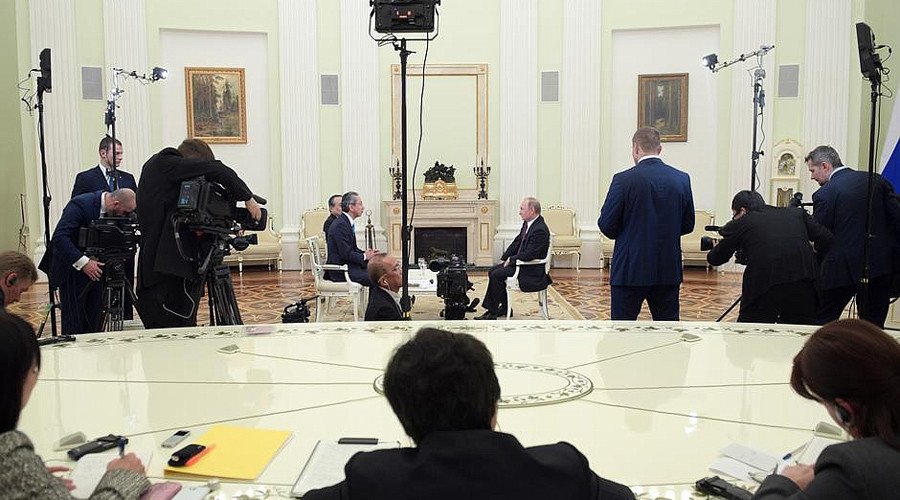
Question: You pointed out once that the judo spirit should be used to resolve the territorial problem. If we go back to that analogy, is the match still ongoing? That is, let us say, the Olympic regulations allow for competing only for five minutes. Are we still within the five minutes? How long is it before the match ends? Or are we already playing extra time?
Vladimir Putin: No, look, as I said earlier, we were in negotiations, but then the Japanese side suspended them unilaterally. Now, at the request of our Japanese partners, we have reopened these talks. What command is given in this case in judo? You probably know better than I do: Yoshi (continue). So we will continue.
Question: So it appears that this command reflects the coinciding will of both parties is to continue? In other words, there is another path that has not been trailed before the match is over, and we are unable to say how much of that path is still left. Is that how you see things?
Vladimir Putin: Yes, I believe there are a lot of questions today that require expert analysis by various agencies: political agencies, foreign ministries, economic agencies and security agencies. We need to assess everything and understand what we can agree on and what the implications will be both for Japan and for Russia so that both the Russian people and the Japanese people come to the conclusion that these compromise solutions are acceptable and are in our countries’ interests.
Question: Does Russia believe it has no other issues with Japan except this one?
Vladimir Putin: Could you repeat that please?
Question: Does Russia have no other territorial disputes except this problem with Japan?
Vladimir Putin: We believe we have no territorial problems at all. It is only Japan that believes it has territorial problems with Russia. We are ready to talk about this.
Question: But, as we see it, the exchange continues at a high level, and a new approach is being sought. The Japanese Prime Minister speaks about a new approach, and there has been some progress in this respect. However, judging by what you have said, that is not how things stand and there has been no progress yet? That is the impression I am getting. Am I wrong?
Vladimir Putin: Yes and no. There is progress in the sense that the Prime Minister has proposed, outlined, as it were, directions for movement toward a peace treaty and the resolution of issues related to territorial problems. Now, what did he propose? He proposed promoting an environment of trust and cooperation. I believe it is even hard to imagine that it can be any different, that we can agree to sign the documents that we are talking about without trusting each other or without cooperation. That is simply impossible even to imagine.
Therefore, we agree with this and in this respect, certainly, there is progress. For example, the Prime Minister proposed advancing to a new level of economic engagement, putting forward eight lines of cooperation in the most important and interesting areas both for Russia and for Japan. The Prime Minister also highlighted the need to address general humanitarian issues. We already mentioned one of these issues: visa-free travel by Japanese citizens to the South Kuril Islands.
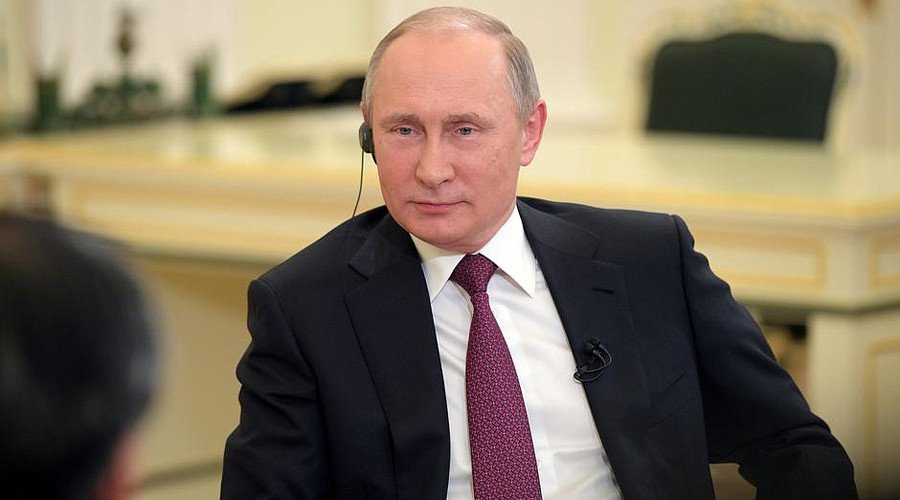
There are also other areas. For example, culture. This is extremely important. We keep revisiting sport, judo, because I practice it, but other than that, there is also culture. Every year events that are in some way or other related to Russia take place in Japan. Next year, we are going to hold a series of events there that we would like to call Russian Seasons. Over 40 different activities – and what is more, in different cities.
I assure you that interest in Japanese culture in Russia is just as strong as interest in Russian culture in Japan. It is simply that we treat Japanese history, the history of the Japanese people and its unique culture with greater respect and interest. This generates enormous interest in Russia!
All of this, if we do it, if we work to achieve all this, we can and should talk about joint efforts toward ensuring international security, and not only in the Far East. Are we not concerned, for example, by the growing danger related to the proliferation of weapons of mass destruction and missile technology? All of this poses a clear threat to the world, to the region. However, we have obvious points of convergence that are related to our interests. If we act together along these lines, we will create conditions, the conditions for trust that Mr Abe speaks about, so as to take another step and conclude a peace treaty on certain terms. However, first, it is essential to cover this part of the way and then agree on the terms for signing a peace treaty. Both are challenging tasks but they are feasible.
Question: Mr President, you have just mentioned Mr Abe’s eight-point plan. You yourself said that this is indeed the only realistic way for such cooperation, a way towards solving the problems.
Do you think the implementation of this plan is one of the crucial conditions for reaching agreement on a peace treaty?
Vladimir Putin: You know, this is not a condition but the creation of a necessary atmosphere.
We conducted talks on border issues with our friends in the People’s Republic of China for 40 years. There were also issues related to specific territories. Now we characterise Russian-Chinese relations as a strategic partnership, even a special strategic partnership. We have never had such a level of trust with China before. China is our major trade and economic partner among foreign states. We implement joint multi-billion projects. We cooperate not only within the UN Security Council, which is logical, as both China and Russia are permanent members of the UN Security Council, but also within such regional organisations as the Shanghai Cooperation Organisation, BRICS, etc. Now we are talking about concluding a free trade agreement between the Eurasian Economic Council, recently established in the post-Soviet space, and China. A similar agreement was concluded a short time ago with Vietnam. Then, we will coordinate, at least we are ready to do this, the Chinese concept of the Silk Road Economic Belt with our newly-created regional organisation. So, do you understand how diverse, multi-faceted and deep Russian-Chinese ties have become over the last couple of decades? And we resolved the border issue. This did not cause any major problems, if there were any in China and Russia in this connection, though we both made some compromises. But these were compromises between friendly countries. I think it is almost impossible to achieve such compromise in other ways. I think Mr Abe’s proposal may be the only way to achieving our goal.
Question: You speak about resolving border issues with China and a very high level of trust with China. However, the relations with Japan have not reached such a level. Is that what you mean?
Vladimir Putin: Look, I have just said we have the highest bilateral turnover and continue liberalising our trade ties, as you know. However, Japan imposed economic sanctions against us. Do you see the difference? Why? Due to the events in Ukraine or in Syria? However, Japan and Russian-Japanese relations are hardly related to the events in Syria or in Ukraine. Therefore, Japan has some alliance obligations. We treat them with respect, but we need to understand the degree of Japan’s freedom and what steps it is ready to take. We should look into this, as these are not minor issues. Our foundation for signing a peace agreement will depend on them. This is the difference between current Russian-Japanese and, for instance, Russian-Chinese relations. I do not want to argue; you asked me what the point is. The point is to create an atmosphere of trust.
READ MORE: Russia to Japan: US missile defense in Asia-Pacific poses security risks
Question: Mr President, you mentioned a package of measures that we need. One of the directions, as you have also mentioned already, could be economic activity. I share this view. Regarding this joint economic activity, how do you envision it? For example, as one option, and this could be done on all the four islands or on some of them, a special economic zone could be established where such interaction could unfold. How do you envision this economic cooperation as you speak about it?
Vladimir Putin: You know, first, I believe we should broadly expand our trade and economic ties. In the past two years, sadly, Russian-Japanese trade has declined significantly, and we should make every effort to restore the previous level (at least restore) and increase it and move on up. As I said, we are natural partners, because, truth be told, we are interested in Japan’s involvement in developing Russia’s Far East in general and in receiving technologies, for instance. And there are positive examples – for instance, in the automobile industry and other spheres, such as agriculture, where the Japanese are eager to work. By the way, we hope that Japan opens its markets to Russian-made eco-friendly meat products.
We have many interesting avenues in the energy industry. Nine percent of the natural gas and oil consumed by Japan comes from Russia. Another prospect for development comes from the Sakhalin-I and Sakhalin-II oil and gas projects, which are up and running, with some 75 percent of the products delivered to Japan under long-term contracts. There are plans for constructing the third plant. The work is underway to implement plans to involve Japanese partners in projects on the Yamal Peninsula in Russia’s north. We have plenty to work on that is promising and large-scale.
As regards the southern Kuril Islands, there are different possible options. We are ready to consider joint efforts on one, two, three, or four islands. The terms are important, but they have to be as liberal as possible. Prime Minister Abe has mentioned this, and I agree with him.
Question: What will be the legal framework of this activity? Will it be a Russian zone or a Japanese zone, or some kind of a joint zone? How can the legal framework for this be organised? There could be several ways and options. What do you think about it?
Vladimir Putin: I think the Japanese are a very creative and intelligent people. You have just shown a brilliant example of this approach to the discussion by raising the point that economic activity can develop on the islands that would be under Japan’s sovereignty. However, if this occurs from the outset, no second step is needed and the issue can be considered closed. That was not the agreement. We agreed to solve political issues first, fundamentally, and then the issues related to signing a peace treaty, or all of this together – but only if we are aware that we will not be able to solve the signing of a peace treaty and territorial disputes solely by drafting plans for our possible future cooperation. That is why this is a matter for detailed, reasonable and substantive professional talks.
Question: As a Japanese, I can say that, of course, joint activities have obvious advantages for Japan. And, if some progress is made on that track, it would be sound to achieve some advancement in solving the territorial dispute. I think many Japanese people harbour such hopes and expectations. Mr President, you yourself have said that the 1956 Declaration is the only legal document signed by our countries that indicates a way towards solving the problem. And the Declaration says that Shikotan and Habomai will subsequently be transferred to Japan.
You have just told us that there may be different interpretations, in particular, regarding under whose sovereignty this may be done. I think if joint activities do yield fruit, if it works, then to what extent could the transfer procedure issue be solved, for example, under whose sovereignty could the islands be handed over?
Vladimir Putin: It is too early to speak about this. You keep referring to the 1956 Declaration but Japan refused to fulfil it. If the Prime Minister and Japan’s Cabinet of Ministers return to this wording, we will discuss it. If you carefully read the declaration (its Article 9), you will see that it mentions the transfer of the islands but does not specify under whose sovereignty or on what terms. There are too many questions about this issue. Even the 1956 Declaration requires a lot of work. And if our Japanese partners go beyond its framework, this is altogether a separate matter. However, to make progress toward resolving such urgent and long overdue issues, I would agree with the Prime Minister that we need to create an atmosphere of trust, friendship and cooperation between our countries. I believe this is exactly where we should start.
Question: Concerning the four islands. Mr Abe says our relations have recently improved in many ways. Regarding the peace treaty talks in the context of the four islands, as long as you both hold the offices of Prime Minister and President, will you be trying to lay the groundwork for resolving the matter? We have already said that both you and Mr Abe enjoy great public support. Are you committed to resolving this problem?
Vladimir Putin: Of course, we are working toward this. We are discussing this sincerely because we are interested in resolving all the problems of the past in our relations with Japan. Nothing should prevent us from moving forward. This is one of our national priorities. This is what we want, and it is in our interest. That said, I believe that fixing some deadline that is limited by my term in office or the Prime Minister’s would be unprofessional because we should talk not about our terms in power but about the quality of potential agreements. This is the first point. Secondly, as I have already mentioned, yes, trust in the President is quite high in Russia, as it is for the Prime Minister in Japan, but I believe, for one, as I have already said, that I have no right to abuse this trust. Needless to say, each of us would like to achieve major results in our work. If we achieve success… I know his position: he wants to complete this process during his term in office, and I would also like to achieve some meaningful, significant results and not only in relations with Japan but also in other areas, such as domestic policy, the economy, and international affairs. Naturally, I will be working toward this, but I still do not know if I will succeed.
Question: Thank you. I apologise but I would like you to give an earnest answer now. Do you perceive Mr Abe as a good partner and as your friend? What is your opinion of him?
Vladimir Putin: I believe that the Prime Minister is, first of all, a consummate professional. This is perfectly obvious. He clearly loves his country very much, is motivated to defend its interests and is very pragmatic in how he goes about it. In my view, he is a very reliable, honourable partner with whom it is possible to agree on highly serious, specific issues. As such, I intend to develop relations with the Prime Minister into the future, including with respect to the most urgent and important issues of our cooperation.
Question: Mr President, I would like to ask one more question about our relations. There is a famous saying in Russia – “slow and steady wins the race.” The part about winning the race is clear, it means strengthening our relations, their progress. But what does the first part – slow and steady – mean? How can we define it?
Vladimir Putin: If you want to understand the meaning of this proverb, it urges one not to rush in making important decisions. Acting carefully and slowly, it is possible to achieve a better result. This proverb does not call for sabotaging a goal, it does not call for pretending instead of taking real steps to reach a goal. No, this is a call for high-quality work without rushing about hastily.
Question: Thank you. Now I would like to digress from Russian-Japanese relations and ask different questions. Relations with the United States. Mr Trump is going to be the next President, and you already had a telephone conversation with him on November 14. What are your impressions of him? What do you think of him?
Vladimir Putin: I only had a telephone conversation with him, whereas Mr Abe met with him in person. So, you should ask the Japanese Prime Minister what impression he has about the newly elected US President. But it is well known, widely known that the US President-elect has publicly spoken in favour of normalising Russian-American relations. We cannot but support this. Of course, we understand that it will not be an easy job, taking into account the degree to which Russian-American relations have degraded. But we are ready to cover our part of the way.
Question: In your Address, you said that you are ready to establish relations and develop cooperation with the new US Administration. In which fields, in which directions are you ready to cooperate with the United States?
Vladimir Putin: In the area of international security, taking into account that the United States and Russia are the largest nuclear powers: We are ready to jointly work to strengthen the non-proliferation regime for weapons of mass destruction and their means of delivery. We are ready to work together, and much closer than before, on the problem of fighting terrorism, international terrorism, and here we certainly have vast opportunities. If we had joined efforts some time ago, we could have avoided many problems the world is facing now, I believe. At any rate, those problems would not be so acute, with numerous terror attacks and victims of those attacks in many areas of the world – in Europe and in the United States. We also never would have had such an urgent problem with refugees, I have no doubt about it. Then there is another area of activity – economic interaction between Russia and the United States. Right now, for example, it has already been made public that we signed a large deal to privatise one of our biggest oil and gas companies, Rosneft, which sold 19.5 percent of its shares to a consortium of Qatar’s sovereign fund and Glencore, one of the world’s largest traders. We know for sure that US companies, as well as Japanese ones, by the way, are keenly interested in cooperation in Russia’s oil and gas sector, in joint work. This has immense significance for world energy markets and will directly affect the whole world economy.
We believe that we could do a great deal to neutralise regional conflicts. Also, for example, to continue joint activities in space, for peaceful civilian purposes. By the way, Japan is also known to be actively engaged in manned space flights as part of the International Space Station. There are many other areas. And I am confident that each of them is of interest to both the people of the United States of America and the Russian people.
All we need is good will, and we have to start working in a way that considers each other’s interests. In my view, this is a mandatory condition. As far as I understand, the president-elect of the United States is ready for such joint work. We do not know yet what it will be like in actual practice. We have to wait for him to take office and form his administration.
We have seen very clearly over these past years that there are quite a few people who are sceptical, or let us put it another way, are cautious about the development of Russian-American relations, but the underlying fundamental interests of the United States and Russia demand that our relations be normalised.
Question: Compared to President Obama, I feel you are strongly determined to develop relations with the new President. Do you plan to meet with him in the near future and discuss all these issues?
READ MORE: Fix ‘toxic’ relations: Ex-Trump adviser Carter Page in Moscow
Vladimir Putin: You know, we were also going to develop relations with the current administration, but somehow they did not work out well in key areas and, I believe, not through our fault. I will not list all the problems that emerged in the past few years. Here is an example: while resolving current issues, our American colleagues made a proposal on the Syrian settlement but then suddenly declared at the UN that they were not going to discuss anything with us. It is necessary to understand what people want in one department versus another department of the United States. Do they have a common position? And this happened many times on very many areas of our cooperation.
There are also fundamental issues related to what the current leader, President Obama, said. I am referring to his idea about American exceptionalism. I am skeptical about this idea. No doubt, the United States and the American people are a gear country and a great people. Nobody disputes this, but talking about exceptionalism is way too much, and this is creating certain problems in relations, and not only with Russia, as I see it.
As for the President-elect, he has his own views on things, and this is also fairly natural. I must admit that we have yet to understand how he will develop his idea, his pledge to make America great again, but I hope this will not hinder the development of our cooperation.
As for meetings, I think the President-elect should be given an opportunity to first form his administration and assume office. Meetings will come next. We are ready to meet at any time, this is no problem for us, but I believe we should be patient and wait for the complicated process of forming the new administration to be complete.
Question: You have mentioned the economic sanctions. Of course, this is a very important topic in the relations between Russia and the United States. Do you have any expectations due to the change of administration?
Vladimir Putin: This is not only a matter of relations between Russia and the United States. In my view, any restrictions in the economic sphere that are dictated by considerations of political expediency are extremely harmful for the world economy as a whole. This destroys unity and the rules of the game.
We spoke about this only recently in Lima, within the framework of APEC. Almost all the leaders represented at APEC (the Asia Pacific region), Pacific countries, spoke about the same thing, namely, that we are going through a very acute crisis in world trade, international trade, related, among other things, to restrictions on the markets of certain countries.
However, this is, among other things, the result of using political tools in competition or simply for achieving political objectives with the help of economic restrictions. This is one of the elements that is destabilising the world economic order that was at one time created largely by the United States itself at the dawn of the General Agreement on Tariffs and Trade that was later transformed into the World Trade Organisation.
Take the creation of the Pacific partnership or the creation of the Atlantic partnership. We are somewhat concerned because this is being done bypassing the World Trade Organisation, since it has proved impossible to reach compromise solutions with developing economies within the framework of that organisation. Is that good? Not really, in my opinion. If the world economy is divided into isolated economic blocs of this kind, it will be rather difficult to achieve the same interpretation and application of international rules of economic activity and world trade. This is why we believe in the universality of these rules. And if regional associations are created, they should work on the basis of WTO norms, on the WTO basis.
This is our premise, but as to how this works out in the near future, when a new administration is formed, we are unable to tell at this point. Time will tell.
We need to bring this gradually to a close or we will keep talking until morning. Although I enjoy talking to you, I probably should not keep you here until morning.
Question: All right. You mentioned China. I would like to go back to this issue.
Vladimir Putin: Please.
Question: You say that your relations are on a very high level both economically and politically.
Vladimir Putin: That is correct.
Question: In your Address to the Federal Assembly, when you mentioned different countries, as far as I remember, China came first, then India, Japan and only after that came the United States. Do you believe that at present China is Russia’s most important partner? Did we understand you correctly?
Vladimir Putin: Absolutely.
Question: Is that really the case?
Vladimir Putin: That is indeed the case. After all, China is our largest trading partner. As I said, country-wise, Russia trades the most with China. That is my first point.
Second, we have wide-ranging joint projects in the nuclear energy sphere, logistics, machine building and trade as a whole. We have good joint projects in the helicopter and aircraft manufacturing industry. We are considering cooperation and are actively cooperating in space. There are good prospects there. However, the level of our political trust is also very high. We have similar positions on major international issues or even, as diplomats say, our views are identical. We often have shared positions on key issues of the modern international agenda. We have very close humanitarian contacts, wide-ranging youth exchanges, educational and regional contacts, and all of them continue to develop. We are expanding and improving the infrastructure of our relations. You must have heard about China’s plans to participate in building a high-speed railway line between Moscow and Kazan in the Volga region, in central Russia. And then we plan to extend it to Kazakhstan and on to China.
Under our regional cooperation projects, we are building roads and bridges. The scope of regional cooperation is constantly growing. So, we have every reason to say, and I note this with great satisfaction, that a truly friendly relationship has evolved with China, and in many key areas these relations, without any exaggeration, have a strategic character. As we say, the strategic character of privileged partnership.
Question: I would like to go back to the international situation. There has been a lot of populism, something you have mentioned as well. It would be interesting to hear your thoughts on the matter.
Vladimir Putin: What thoughts can there be? Political populism always poses a great danger because it disorients people, creates excessive expectations or, on the contrary, prioritises objectives that are clearly not priorities or are simply impossible to achieve. This work is either useless or harmful, because there is nothing good about populism. If you wanted to hear my opinion on this issue, that is what I think.
As a rule, this is done for the sake of political expediency by those who do not care about the consequences, who do not think even one step ahead, who do not want to think and do not intend to honour their commitments.
Question: I would like to ask another question regarding Russia’s domestic situation. Presidential elections are set to be held in 2018. You enjoy tremendous support among Russians. How do you think you have managed to secure such a high level of support? I would especially like to hear your analysis on why young people support you.
Vladimir Putin: Perhaps, you should ask the people who support me. I think that people are able to see that I am working hard, that I am striving openly, honestly and sincerely to achieve the results the results our country needs. I think that they are also able to see that not all goes well. Our people are smart and sharp-sighted. Yet, I believe that the main thing is to sincerely aspire to achieve the maximum, so that the country feels more secure and people live better. That's precisely how I am trying to go about my work. And I am very grateful to our people who appreciate my work and for their support, as without that support it would have been impossible to get anything done.
Question: Do you feel that there is someone among the Japanese who you truly respect and who has had a real influence on you?
Vladimir Putin: Jigoro Kano, of course.
Question: Do you have this person’s bust or a portrait?
Vladimir Putin: I have several portraits of Jigoro Kano and a bust too, a very beautiful one. Unfortunately, I do not have it here, or I would have shown it to you. I keep it at home, in my residence, where I live permanently. It's a very good, high-quality work by a Russian sculptor, depicting not just a strong-willed but also thoughtful and kind man.
Question: You have already said that judo is a philosophy as well. And judging by you that is indeed the case.
Vladimir Putin: (Laughing) It can be seen by judo and by those who love it.
Question: I see. If I may, I would like to ask the last question. On the eve of your visit to Japan, perhaps you have some message for the Japanese people. Do you have any words you would like to address to the Japanese before your visit?
Vladimir Putin: I would like to say, you know, that, unfortunately, we have many unresolved problems. But a great number of people in Russia know Japan and love Japan, and I am sure that eventually we will resolve all our problems. Irrespective of when this may happen, it would not be an exaggeration to say that today millions of people living in Russia and, I am sure, millions of people living in Japan have an urge to get to know each other, cooperate and exchange useful information, as well as a sincere desire that all problems that still remain unresolved be resolved.
Question: As a Japanese citizen, I truly wish that your visit will be a success. Thank you very much for finding the time for us in your very busy schedule. We hope that your visit will be very useful for the bilateral relations.
Thank you.
